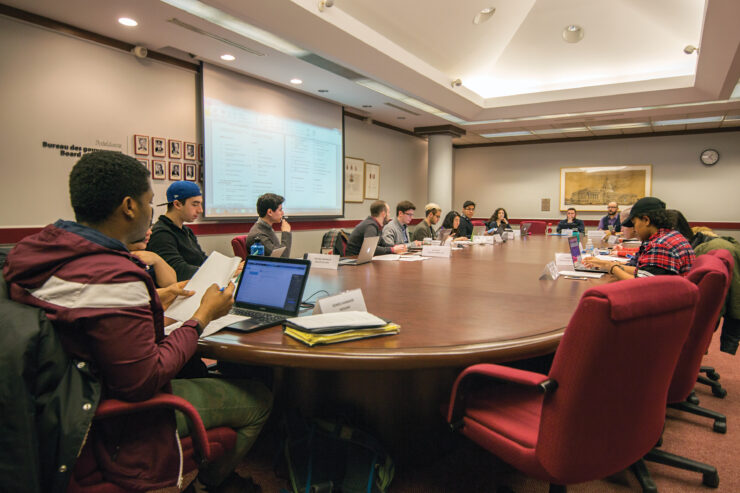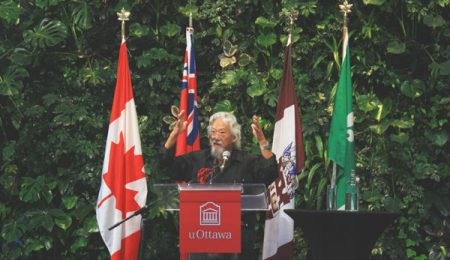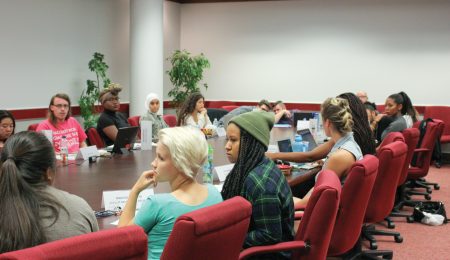Concerns raised over U-Pass usage by part-time execs due to “grey period”
During the March 12 Board of Administration (BOA) meeting, a motion was read to ratify the results of the Student Federation of the University of Ottawa’s (SFUO) February election and subsequent dismissals from the BOA.
Chief electoral officer (CEO) Qussai Abu-Naqoos also gave an oral report on the problems he faced during the elections process. Abu-Naqoos started by praising the work of the poll clerks and SFUO vice-president university affairs and acting chief returning officer Vanessa Dorimain.
According to Abu-Naqoos, the elections office staff were the sole reason why voter turnout was the highest it has been in years, at 14.6 per cent. In his eyes, members of the elections office went “beyond expectations and beyond pay.”
The report then highlighted some of the issues during the hiring and election period, such as the fact that Abu-Naqoos was hired only 15 days before the election and allegedly received minimal help from executive coordinator Jesse Root.
Abu-Naqoos also noted that his CEO contract was not structured well, and he received inadequate training for the job.
He then went on to say there were “constant attacks and mistrust” from board members, and an undermining of the elections office by the board. Even after the election was over, BOA representatives allegedly voiced their opinions both in meetings and in public, saying that some candidates had “competed against the elections office as a whole.”
Abu-Naqoos further said that he received complaints from students about decisions made by the BOA—decisions that were made without his input.
He also brought up threats made against him by candidates, which led to several faculty directors being disqualified and removed from the board following the election.
Finally, the report raised issues with ballot counting, specifically in the race for vice-president of university affairs, where Faculty of Engineering representative Jeffry Colin’s win was overturned and Faculty of Sciences rep Axel Ngamije-Gaga was elected after a recount.
Abu-Naqoos said the miscount was due to human error, as an elections office employee recorded the wrong numbers, giving Colin an original 103-point advantage.
Following the report, Faculty of Law (common section) representative Lee Chitty asked about the financial costs of the election. Abu-Naqoos responded that the accounting department has yet to finish going through the numbers. However, the SFUO supposedly saved around $2,000 due to Abu-Naqoos and Dorimain’s increased workload.
SFUO president Roméo Ahimakin then asked about problems with international student voting. Abu-Naqoos said the student voter list he initially received did not contain international students. Nevertheless, international students were still able to vote, as Abu-Naqoos checked the names himself.
Ahimakin also raised concerns about the hiring of the election’s promotional team—some of whom were BOA members—which he said contravened the constitution. Dorimain responded that these members resigned once they were made aware of this unconstitutionality.
Colin then asked the CEO how he could be confident with the other results after the major error for vice-president of university affairs. Abu-Naqoos acknowledged that the error was due to one mistake inputting a number, and that the elections office was “confident” it hadn’t happened elsewhere. The vote margins in the other races was much safer and less likely to have been affected by an error, according to Abu-Naqoos.
Abu-Naqoos suggested investing in more employees to count ballots for the future, due to errors in the ballot-counting machines.
After some debate, the board adopted both the election results and the CEO’s oral report.
Executive U-Pass usage
Later in the meeting, Chitty presented a report by the disciplinary committee after complaints were made alleging that some executives had obtained U-Passes while being part-time students.
According to the SFUO constitution section 3.2.7.2.1, all executives are required to take no more than seven credits a semester. As most U of O courses are three credits each, this translates roughly two classes per semester. This would make them them part-time students, according to the university, as they are taking less than 12 credits (four classes), and only full-time students are eligible for a U-Pass.
The section of the constitution continues that an executive could take more than seven credits, but any work for those credits would have to be deferred until after their executive mandate has ended. None of the executives have declared which classes they are taking.
Separate complaints had been filed against vice-president social Hadi Wess, Dorimain, vice-president finance Rizki Rachiq, and vice-president equity Morissa Ellis. Chitty said that while there were issues with these executives using U-Passes, the committee was not recommending any penalties against anyone.
According to Chitty, Wess did indeed have a U-Pass, but was “qualified” for it. Chitty did not explain what these qualifications were.
The committee found that Dorimain had had a U-Pass and was not qualified, but that the U-Pass was allegedly obtained under special circumstances. Chitty noted that the pass was obtained during a “grey period,” and was taken from a group of passes that were not distributed due to “errors.”
The third complaint against Rachiq highlighted that he failed in his duties as head of SFUO human resources by allowing staff to carry improper U-Passes. Chitty said that the committee did not find a breach of the rules in this case.
Finally, Chitty said that Ellis was eligible to receive a U-Pass by originally registering for five classes, making her a full time student. While this contravenes the SFUO constitution on executives, Ellis later dropped down to part-time status.
According to Chitty, the committee had some problems during discussions with Dorimain as part of the investigation. Initially, the committee told Dorimain that she would be suspended from the U-Pass portfolio with pay, and that she was unhappy with this decision. After the interview with Dorimain, the committee determined that no theft had technically taken place, and decided not to suspend her from the portfolio.
Chitty said that the disciplinary committee recommended fixing this “grey period” so it cannot be used improperly in the future.
After Chitty finished delivering the report, Wess made a joint statement on behalf of himself and Dorimain, speaking on how the investigation was initiated and how the pair were depicted in the media.
Wess said that Ahimakin failed to support him and Dorimain in fixing the U-Pass issues in a private executive meeting, and that the president should not have sent the matter to the disciplinary committee.
Ahimakin later rebutted that as president he has no powers to police such a situation, and that only the disciplinary committee was capable of finding a solution.
Wess also accused vice-president of services and communications Francesco Caruso of not communicating with himself and Dorimain properly in dealing with the situation.
Wess then discussed an article by la Rotonde which discussed U-Pass usage by members of the executive and its accompanying artwork, which depicted himself and Dorimain holding U-Passes. Wess called the article “obscene” and “false,” and that it was an attempt to discredit them both.
Following the publication of the article, Wess said he and Dorimain were subjected to bullying and insults over social media.
In his statement, Wess demanded apologies from Ahimakin and Caruso, and that la Rotonde take down its U-Pass article and issue an apology.
“La Rotonde: with this article, you did not give information, you gave contribution to a horrible gossip, racist and bullying culture,” Wess said in the statement.
Wess continued, “(Dorimain and I) have been slandered, defamed, vilified, students have come into (Dorimain)’s office yelling at her and sending messages on social media challenging her intelligence and loyalty to the program, and there has been baseless allegations and false reports on situations in which we were involved.”
The board then moved to adopt the report of the disciplinary committee.





